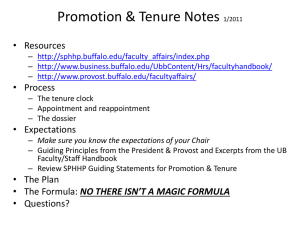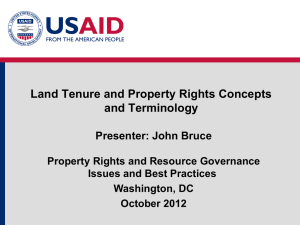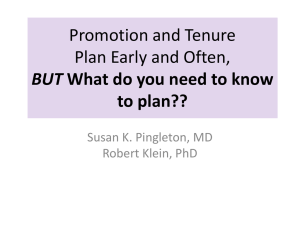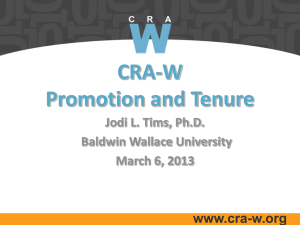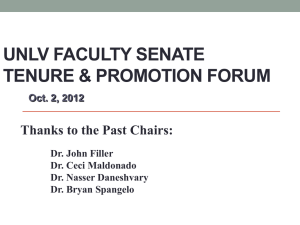Promotion and Tenure Workshop - Howard University, Graduate
advertisement
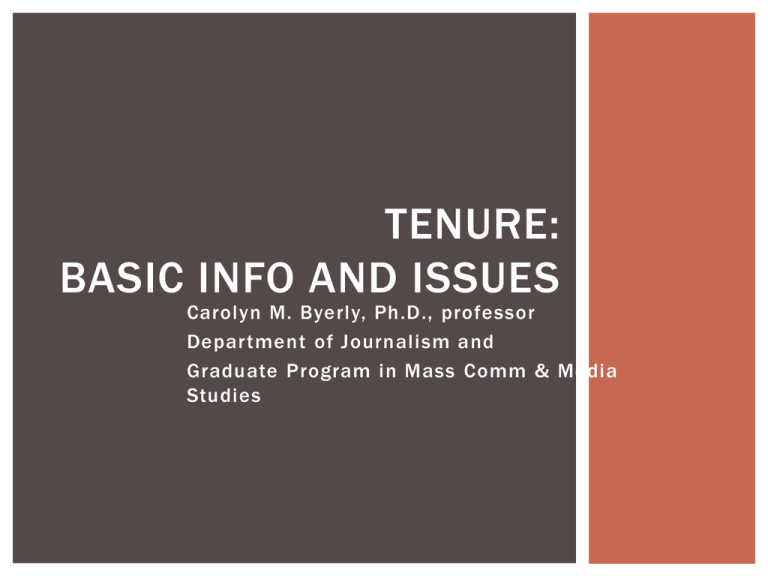
TENURE: BASIC INFO AND ISSUES Carolyn M. Byerly, Ph.D., professor Department of Journalism and Graduate Program in Mass Comm & Media Studies DEFINITION Tenure in higher education is the granting of indefinite employment to faculty who successfully complete a period of probationary employment (typically 4 -6 years). A tenured faculty member can only be dismissed for violations of university policy or other just cause. PURPOSE OF TENURE The 1940 Statement of Principles on Academic Freedom and Tenure in the AAUP (aaup.org) states: The purpose of this statement is to promote public understanding and support of academic freedom and tenure and agreement upon procedures to ensure them in colleges and universities. Institutions of higher education are conducted for the common good and not to further the interest of either the individual teacher or the institution as a whole. The common good depends upon the free search for truth and its free exposition. (emphasis added) ACADEMIC FREEDOM Academic freedom is essential to these purposes and applies to both teaching and research. Freedom in research is fundamental to the advancement of truth. Academic freedom in its teaching aspect is fundamental for the protection of the rights of the teacher in teaching and of the student to freedom in learning. It carries with it duties correlative with rights. TENURE = ACADEMIC FREEDOM Tenure is a means to certain ends; specifically: (1) freedom of teaching and research and of extramural activities, and (2) a sufficient degree of economic security to make the profession attractive to men and women of ability. Freedom and economic security, hence, tenure, are indispensable to the success of an institution in fulfilling its obligations to its students and to society. (From AAUP.org, academic freedom) OTHER BENEFITS OF TENURE: Service on committees – in many universities, tenure is required for service on, e.g.: Appointments, promotion & tenure (APT) committees Faculty Senate Council Judiciary Committees (student and faculty) Faculty Grievance Committees Ability to successfully establish longer -term research studies Funding sources want to see a track record, secure employment CRITERIA FOR TENURE Policies for Tenure & Promotion in your department spell out more clearly what you have to do in each of these categories. Consideration for tenure is based on demonstrated excellence in: Timeframe: Typically 6 years (go up in 5 th ) unless candidate is unusually productive CRITERIA FOR TENURE (CONT.) RESEARCH: Evidence of sustained productivity Refereed conference papers Refereed articles in acceptable journals (1-2/year) Book chapters in edited volumes of established scholars Book(s) published by academic publishing houses that send out proposals for blind review Positive reviews of books and/or receipt of awards from peers in field, organizations Seeking and/or receiving grants for research Leadership (e.g., chair divisions in associations) CRITERIA FOR TENURE (CONT.) TEACHING: Student evaluations with scores in upper ranges Positive peer evaluations (by dept. colleagues, chair and/or dean) Innovative course (re)development Incorporation of technology into course designs Involvement in curriculum development Obtaining grants to develop courses or benefit students RESEARCH OR TEACHING? Colleges and universities are typically categorized as either “research” or “teaching” schools. Know which of these your campus considers itself to be because that will suggest what is emphasized in tenure requirements. CRITERIA FOR TENURE (CONT.) SERVICE: Serving on department, school, university committees Serving on committees of professional organizations Organizing and/or coordinating events Holding leadership posts in community organizations Giving guest (invited) lectures, either in dept or elsewhere Other activities that advance your dept, school, university or field AT RESEARCH INSTITUTIONS Committees are typically concerned with: 1) Productivity – number of refereed publications, other publications, refereed conference papers 2) Quality of publications – prestigious often preferred 3) Consistency – work is even in its progress rather than all bunched up as tenure time approached CONTINUED: 4) Coherence – work is connected thematically, methodologically, or/or in other ways (i.e., that there has been a clear trajectory or path) 5) Significance to field – work expands known knowledge, sets forth new ideas, etc., on things deemed most important TENURE & PROMOTION PROCESS Typical due process in tenure & promotion: 1- Annual evaluations signal how you are doing 2- “Midpoint” review – some departments provide a comprehensive review to assess whether you are on track for tenure (can be requested) 3- Tenure time: Submit portfolio with evidence in research, teaching, service Select external reviewers (usually 4-6) Departmental T & P committee, Chairman, School T & P Committee, Dean, Provost, President all evaluate and rule Tenure (& usually promotion) awarded or denied ISSUES TO CONSIDER 1) Is this the right campus for YOU? 2) What do you want to contribute to your field? 3) How savvy are you about academic politics? 4) Do you have a solid intellectual network, on campus and across your field? 5) Have you built good working relationships with your colleagues in the department and campus? 6) Do you have a plan in case you are denied tenure? CONTACT INFO Dr. Carolyn Byerly cbyerly@earthlink.net
